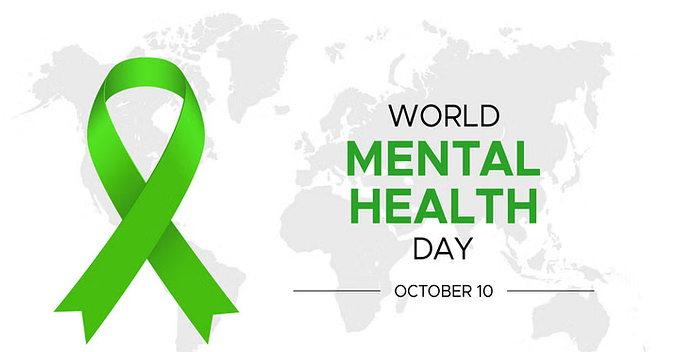World Mental Health Day 2024 (GS Paper 1, Society)

Context
- World Mental Health Day is observed every year on October 10, a date first established in 1992 by the World Federation for Mental Health (WFMH).
- The day serves to raise awareness about mental health issues and mobilize global efforts to improve mental health care.
Current Mental Health Landscape in India
- India is facing a significant increase in mental health disorders.
- According to The Lancet Psychiatry Commission, over 197 million people in the country are afflicted with conditions such as depression, anxiety, and substance abuse.
- This surge in mental health issues correlates with the rapid economic growth that has brought new opportunities but also intensified societal pressures and personal expectations.
- As India strives toward ambitious developmental goals, mental well-being is often overshadowed, leading to a crisis exacerbated by materialism and a growing disconnect from community ties and self-awareness.
Causes of Mental Illness
Several factors contribute to the rising incidence of mental health disorders in India:
- Socioeconomic Challenges: Exposure to poverty, violence, inequality, and environmental deprivation significantly impacts mental health.
- Pandemic Impact: The COVID-19 pandemic and its associated lockdowns have further deteriorated mental well-being, causing increased anxiety and isolation.
- Adverse Life Experiences: Trauma from childhood experiences, such as abuse or witnessing violence, can have lasting effects on mental health.
- Substance Abuse: The use of alcohol and drugs, along with feelings of loneliness, are prevalent contributors to mental health issues.
- Family Dynamics: Dysfunctional family relationships and a lack of supportive environments can lead to mental health deterioration.
- Consumer Culture: The urban focus on consumerism fosters a culture where self-worth is tied to material possessions, leading to feelings of inadequacy and social comparison.
Shortage of Mental Health Professionals
India faces a critical shortage of mental health professionals:
- The World Health Organization (WHO) recommends three psychiatrists per 100,000 people; however, India has only 0.75 psychiatrists per 100,000 population.
- Among BRICS nations, India, along with Ethiopia, has one of the lowest ratios of psychiatrists to the population.
- Current projections suggest it would take about 27 years for India to meet the WHO's recommended standard without significant policy interventions.
Government Initiatives
To address mental health challenges, the Government of India has implemented several initiatives:
- National Mental Health Programme (NMHP): Launched in 1982, this program aims to enhance mental health services through community-based approaches, improving care across all health system levels.
- Mental Healthcare Act, 2017: This landmark legislation decriminalizes suicide attempts and includes provisions for “advanced directives,” allowing individuals to dictate their treatment plans. It also introduces measures to combat stigma.
- Rights of Persons with Disabilities Act, 2017: This act recognizes mental illness as a disability, enhancing rights and entitlements for those affected.
- Manodarpan Initiative: Part of the Atmanirbhar Bharat Abhiyan, this initiative provides psycho-social support for students, focusing on their mental health and well-being.
- Kiran Helpline: A dedicated helpline aimed at suicide prevention, offering support and crisis management.
- National Tele-Mental Health Programme: Launched in 2022, this initiative aims to provide mental health services through telemedicine, especially benefiting underserved areas.
- Economic Survey 2023-24: For the first time, this survey addresses mental health, emphasizing its significance and calling for effective policy implementation to bridge existing gaps in mental healthcare.
Way Forward
To effectively address India's mental health crisis, a comprehensive approach is essential:
- Combatting Stigma: There is an urgent need to challenge the stigma surrounding mental health issues, encouraging individuals to seek timely help.
- Integrating Mental Health into Public Health: Mental health should become a core component of public health programs, focusing on screening high-risk groups and enhancing interventions.
- Focus on Vulnerable Populations: Special attention should be given to children and other vulnerable groups who may be experiencing domestic or sexual violence.
- Collective Action and Community Solutions: Shifting the focus from individual success to collective well-being is vital in tackling mental health challenges.
- Redefining Success: Addressing the mental health crisis requires a re-examination of what constitutes a "good life," moving away from materialistic definitions towards prioritizing mental, emotional, and social well-being.
Conclusion
- World Mental Health Day serves as a crucial reminder of the need for a concerted effort to enhance mental health awareness and care in India.
- By addressing the root causes of mental health disorders, reducing stigma, and improving access to care, India can foster a healthier society where mental well-being is prioritized and supported.


